University Assignment: Formal Ethics Codes in Christian Counseling
VerifiedAdded on 2022/12/05
|7
|1492
|355
Report
AI Summary
This report delves into the formal ethics codes established by the American Association of Christian Counselors (AACC). It outlines the context and need for these codes, emphasizing their role in guiding Christian counselors and other care providers. The report discusses the historical context, highlighting the 2014 revision that aligned the AACC's ethical standards with those of other professional organizations such as the APA, ACA and AAMFT. It details the eight foundational principles of the code: compassion, competence, consent, confidentiality, cultural regard, case management, collegiality, and community presence. The report examines features of the code, such as its focus on client support, ethical conduct, and promoting excellence in Christian counseling. It also explains the code's usage and its importance in maintaining client confidentiality and upholding ethical standards within the AACC. The report concludes by emphasizing the voluntary nature of the code, its role in promoting client well-being, and the ethical principles that guide the behavior of Christian counselors. The assignment includes a bibliography of relevant sources.
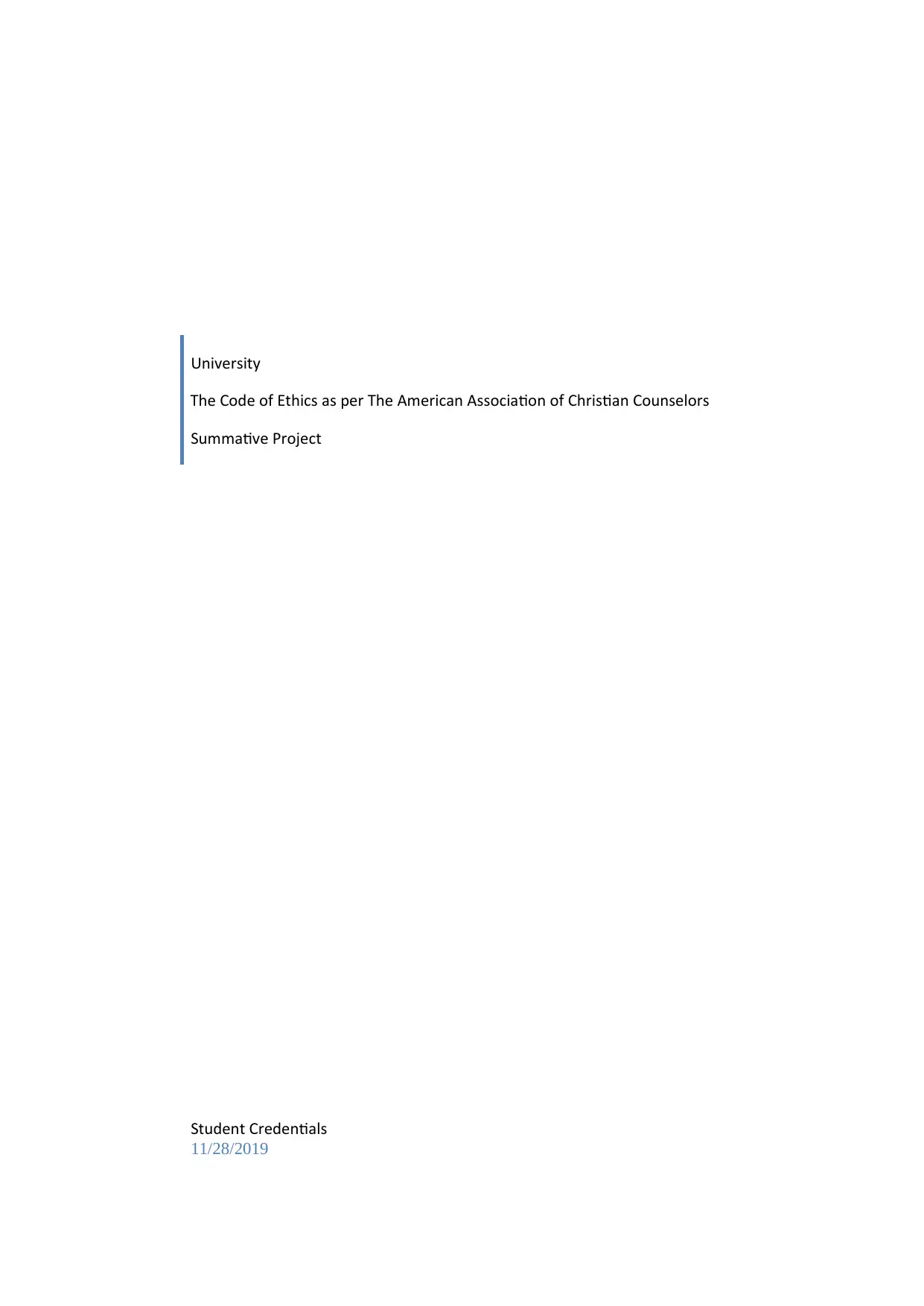
University
The Code of Ethics as per The American Association of Christian Counselors
Summative Project
Student Credentials
11/28/2019
The Code of Ethics as per The American Association of Christian Counselors
Summative Project
Student Credentials
11/28/2019
Paraphrase This Document
Need a fresh take? Get an instant paraphrase of this document with our AI Paraphraser
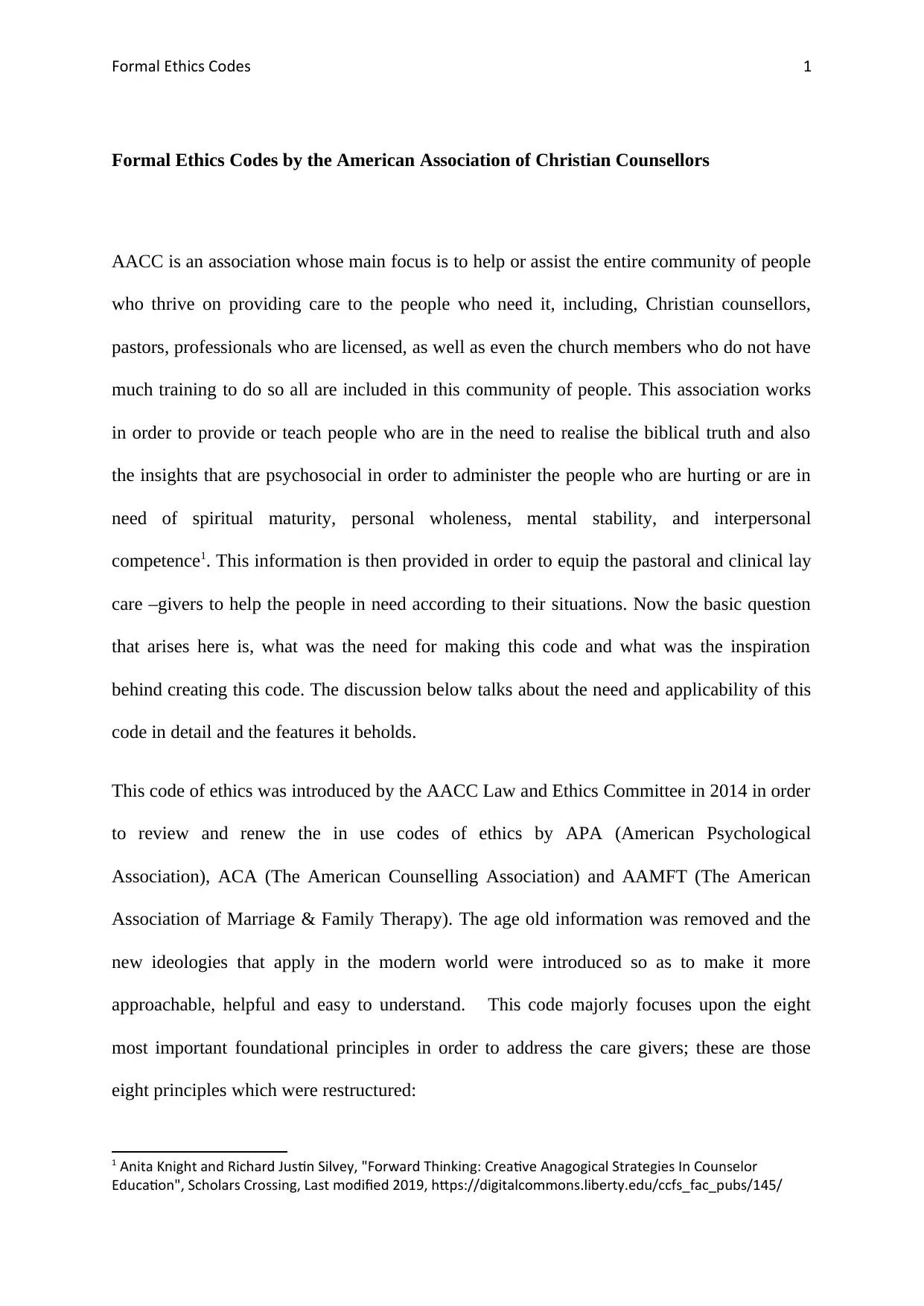
Formal Ethics Codes 1
Formal Ethics Codes by the American Association of Christian Counsellors
AACC is an association whose main focus is to help or assist the entire community of people
who thrive on providing care to the people who need it, including, Christian counsellors,
pastors, professionals who are licensed, as well as even the church members who do not have
much training to do so all are included in this community of people. This association works
in order to provide or teach people who are in the need to realise the biblical truth and also
the insights that are psychosocial in order to administer the people who are hurting or are in
need of spiritual maturity, personal wholeness, mental stability, and interpersonal
competence1. This information is then provided in order to equip the pastoral and clinical lay
care –givers to help the people in need according to their situations. Now the basic question
that arises here is, what was the need for making this code and what was the inspiration
behind creating this code. The discussion below talks about the need and applicability of this
code in detail and the features it beholds.
This code of ethics was introduced by the AACC Law and Ethics Committee in 2014 in order
to review and renew the in use codes of ethics by APA (American Psychological
Association), ACA (The American Counselling Association) and AAMFT (The American
Association of Marriage & Family Therapy). The age old information was removed and the
new ideologies that apply in the modern world were introduced so as to make it more
approachable, helpful and easy to understand. This code majorly focuses upon the eight
most important foundational principles in order to address the care givers; these are those
eight principles which were restructured:
1 Anita Knight and Richard Justin Silvey, "Forward Thinking: Creative Anagogical Strategies In Counselor
Education", Scholars Crossing, Last modified 2019, https://digitalcommons.liberty.edu/ccfs_fac_pubs/145/
Formal Ethics Codes by the American Association of Christian Counsellors
AACC is an association whose main focus is to help or assist the entire community of people
who thrive on providing care to the people who need it, including, Christian counsellors,
pastors, professionals who are licensed, as well as even the church members who do not have
much training to do so all are included in this community of people. This association works
in order to provide or teach people who are in the need to realise the biblical truth and also
the insights that are psychosocial in order to administer the people who are hurting or are in
need of spiritual maturity, personal wholeness, mental stability, and interpersonal
competence1. This information is then provided in order to equip the pastoral and clinical lay
care –givers to help the people in need according to their situations. Now the basic question
that arises here is, what was the need for making this code and what was the inspiration
behind creating this code. The discussion below talks about the need and applicability of this
code in detail and the features it beholds.
This code of ethics was introduced by the AACC Law and Ethics Committee in 2014 in order
to review and renew the in use codes of ethics by APA (American Psychological
Association), ACA (The American Counselling Association) and AAMFT (The American
Association of Marriage & Family Therapy). The age old information was removed and the
new ideologies that apply in the modern world were introduced so as to make it more
approachable, helpful and easy to understand. This code majorly focuses upon the eight
most important foundational principles in order to address the care givers; these are those
eight principles which were restructured:
1 Anita Knight and Richard Justin Silvey, "Forward Thinking: Creative Anagogical Strategies In Counselor
Education", Scholars Crossing, Last modified 2019, https://digitalcommons.liberty.edu/ccfs_fac_pubs/145/
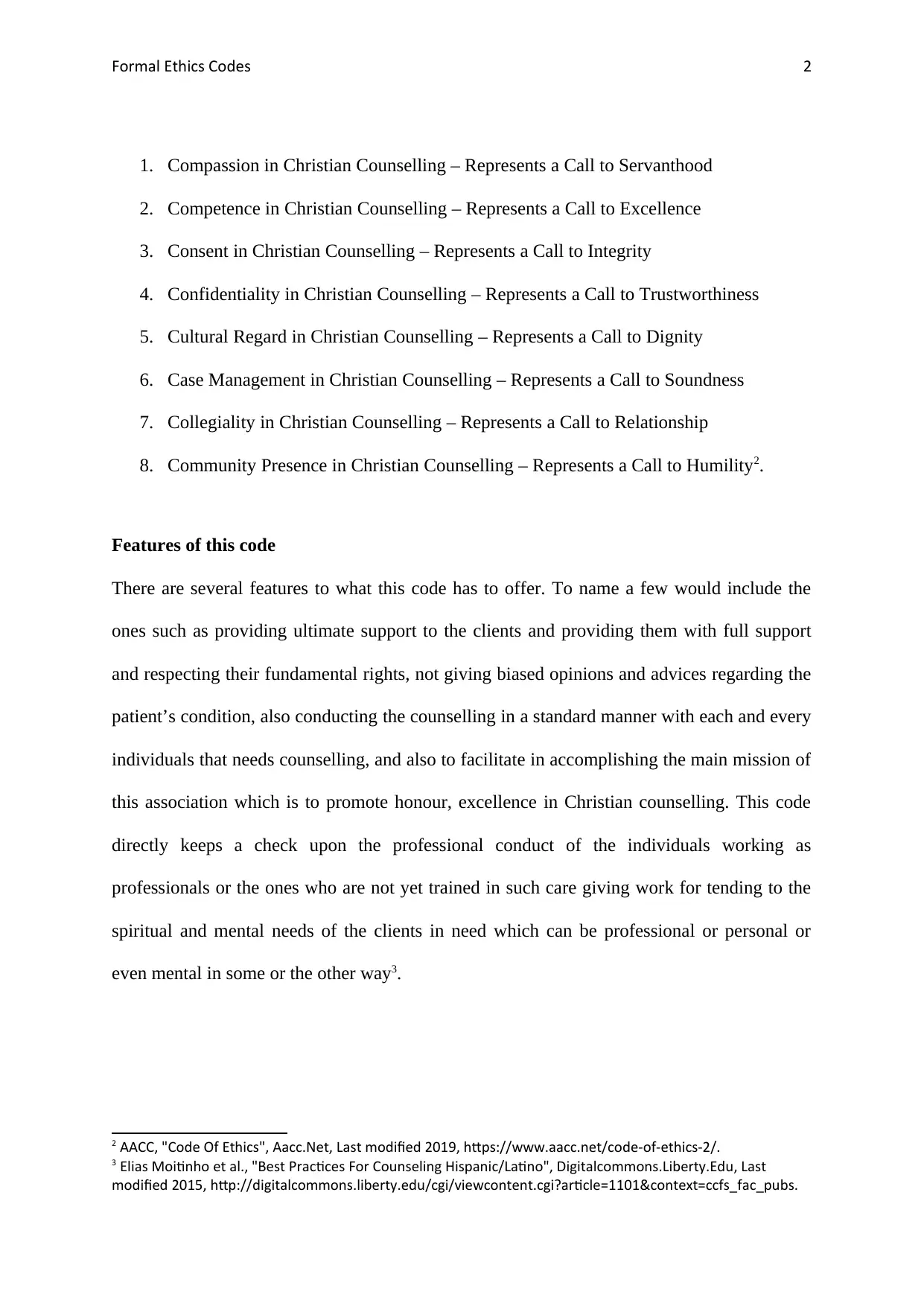
Formal Ethics Codes 2
1. Compassion in Christian Counselling – Represents a Call to Servanthood
2. Competence in Christian Counselling – Represents a Call to Excellence
3. Consent in Christian Counselling – Represents a Call to Integrity
4. Confidentiality in Christian Counselling – Represents a Call to Trustworthiness
5. Cultural Regard in Christian Counselling – Represents a Call to Dignity
6. Case Management in Christian Counselling – Represents a Call to Soundness
7. Collegiality in Christian Counselling – Represents a Call to Relationship
8. Community Presence in Christian Counselling – Represents a Call to Humility2.
Features of this code
There are several features to what this code has to offer. To name a few would include the
ones such as providing ultimate support to the clients and providing them with full support
and respecting their fundamental rights, not giving biased opinions and advices regarding the
patient’s condition, also conducting the counselling in a standard manner with each and every
individuals that needs counselling, and also to facilitate in accomplishing the main mission of
this association which is to promote honour, excellence in Christian counselling. This code
directly keeps a check upon the professional conduct of the individuals working as
professionals or the ones who are not yet trained in such care giving work for tending to the
spiritual and mental needs of the clients in need which can be professional or personal or
even mental in some or the other way3.
2 AACC, "Code Of Ethics", Aacc.Net, Last modified 2019, https://www.aacc.net/code-of-ethics-2/.
3 Elias Moitinho et al., "Best Practices For Counseling Hispanic/Latino", Digitalcommons.Liberty.Edu, Last
modified 2015, http://digitalcommons.liberty.edu/cgi/viewcontent.cgi?article=1101&context=ccfs_fac_pubs.
1. Compassion in Christian Counselling – Represents a Call to Servanthood
2. Competence in Christian Counselling – Represents a Call to Excellence
3. Consent in Christian Counselling – Represents a Call to Integrity
4. Confidentiality in Christian Counselling – Represents a Call to Trustworthiness
5. Cultural Regard in Christian Counselling – Represents a Call to Dignity
6. Case Management in Christian Counselling – Represents a Call to Soundness
7. Collegiality in Christian Counselling – Represents a Call to Relationship
8. Community Presence in Christian Counselling – Represents a Call to Humility2.
Features of this code
There are several features to what this code has to offer. To name a few would include the
ones such as providing ultimate support to the clients and providing them with full support
and respecting their fundamental rights, not giving biased opinions and advices regarding the
patient’s condition, also conducting the counselling in a standard manner with each and every
individuals that needs counselling, and also to facilitate in accomplishing the main mission of
this association which is to promote honour, excellence in Christian counselling. This code
directly keeps a check upon the professional conduct of the individuals working as
professionals or the ones who are not yet trained in such care giving work for tending to the
spiritual and mental needs of the clients in need which can be professional or personal or
even mental in some or the other way3.
2 AACC, "Code Of Ethics", Aacc.Net, Last modified 2019, https://www.aacc.net/code-of-ethics-2/.
3 Elias Moitinho et al., "Best Practices For Counseling Hispanic/Latino", Digitalcommons.Liberty.Edu, Last
modified 2015, http://digitalcommons.liberty.edu/cgi/viewcontent.cgi?article=1101&context=ccfs_fac_pubs.
⊘ This is a preview!⊘
Do you want full access?
Subscribe today to unlock all pages.

Trusted by 1+ million students worldwide
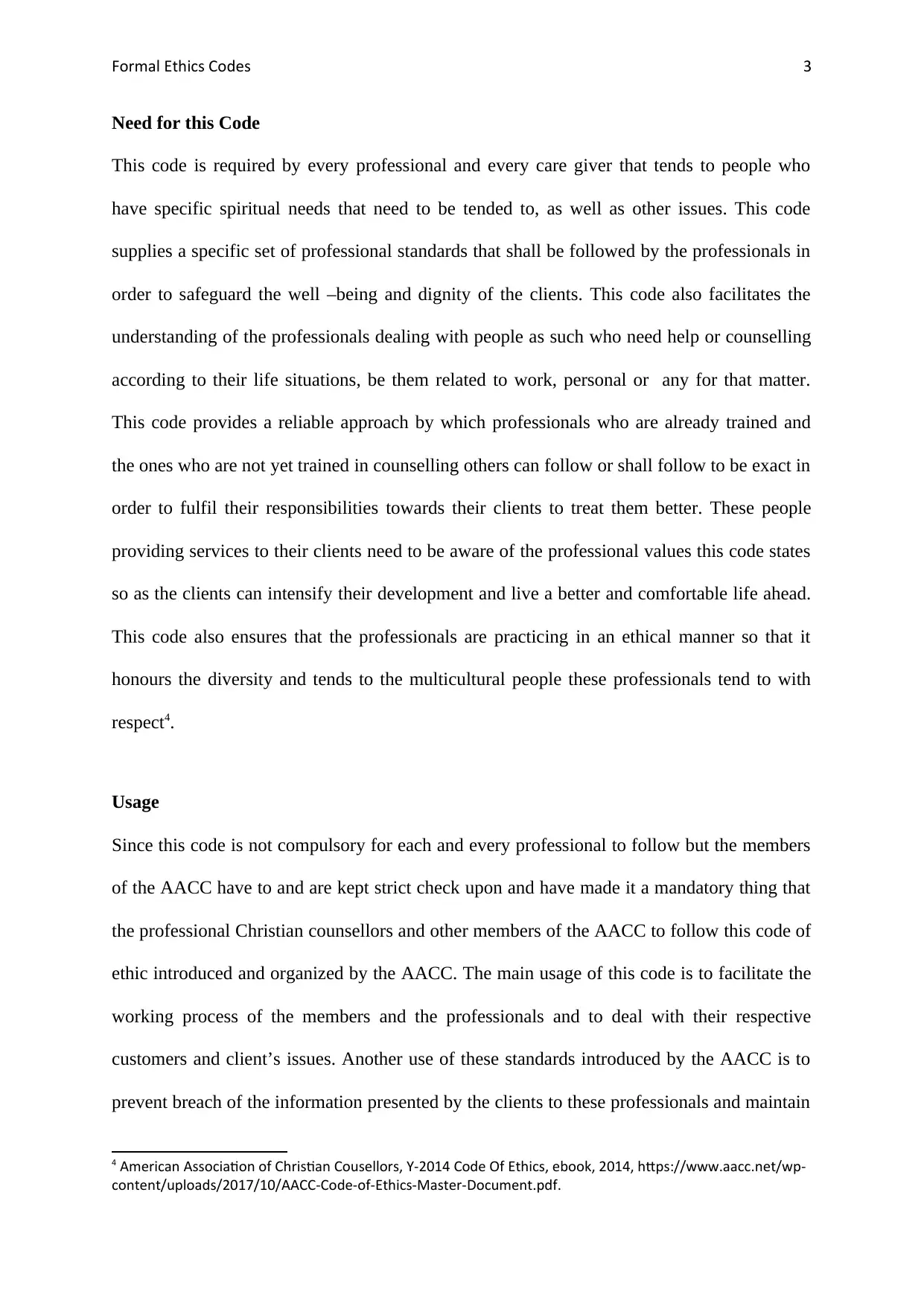
Formal Ethics Codes 3
Need for this Code
This code is required by every professional and every care giver that tends to people who
have specific spiritual needs that need to be tended to, as well as other issues. This code
supplies a specific set of professional standards that shall be followed by the professionals in
order to safeguard the well –being and dignity of the clients. This code also facilitates the
understanding of the professionals dealing with people as such who need help or counselling
according to their life situations, be them related to work, personal or any for that matter.
This code provides a reliable approach by which professionals who are already trained and
the ones who are not yet trained in counselling others can follow or shall follow to be exact in
order to fulfil their responsibilities towards their clients to treat them better. These people
providing services to their clients need to be aware of the professional values this code states
so as the clients can intensify their development and live a better and comfortable life ahead.
This code also ensures that the professionals are practicing in an ethical manner so that it
honours the diversity and tends to the multicultural people these professionals tend to with
respect4.
Usage
Since this code is not compulsory for each and every professional to follow but the members
of the AACC have to and are kept strict check upon and have made it a mandatory thing that
the professional Christian counsellors and other members of the AACC to follow this code of
ethic introduced and organized by the AACC. The main usage of this code is to facilitate the
working process of the members and the professionals and to deal with their respective
customers and client’s issues. Another use of these standards introduced by the AACC is to
prevent breach of the information presented by the clients to these professionals and maintain
4 American Association of Christian Cousellors, Y-2014 Code Of Ethics, ebook, 2014, https://www.aacc.net/wp-
content/uploads/2017/10/AACC-Code-of-Ethics-Master-Document.pdf.
Need for this Code
This code is required by every professional and every care giver that tends to people who
have specific spiritual needs that need to be tended to, as well as other issues. This code
supplies a specific set of professional standards that shall be followed by the professionals in
order to safeguard the well –being and dignity of the clients. This code also facilitates the
understanding of the professionals dealing with people as such who need help or counselling
according to their life situations, be them related to work, personal or any for that matter.
This code provides a reliable approach by which professionals who are already trained and
the ones who are not yet trained in counselling others can follow or shall follow to be exact in
order to fulfil their responsibilities towards their clients to treat them better. These people
providing services to their clients need to be aware of the professional values this code states
so as the clients can intensify their development and live a better and comfortable life ahead.
This code also ensures that the professionals are practicing in an ethical manner so that it
honours the diversity and tends to the multicultural people these professionals tend to with
respect4.
Usage
Since this code is not compulsory for each and every professional to follow but the members
of the AACC have to and are kept strict check upon and have made it a mandatory thing that
the professional Christian counsellors and other members of the AACC to follow this code of
ethic introduced and organized by the AACC. The main usage of this code is to facilitate the
working process of the members and the professionals and to deal with their respective
customers and client’s issues. Another use of these standards introduced by the AACC is to
prevent breach of the information presented by the clients to these professionals and maintain
4 American Association of Christian Cousellors, Y-2014 Code Of Ethics, ebook, 2014, https://www.aacc.net/wp-
content/uploads/2017/10/AACC-Code-of-Ethics-Master-Document.pdf.
Paraphrase This Document
Need a fresh take? Get an instant paraphrase of this document with our AI Paraphraser
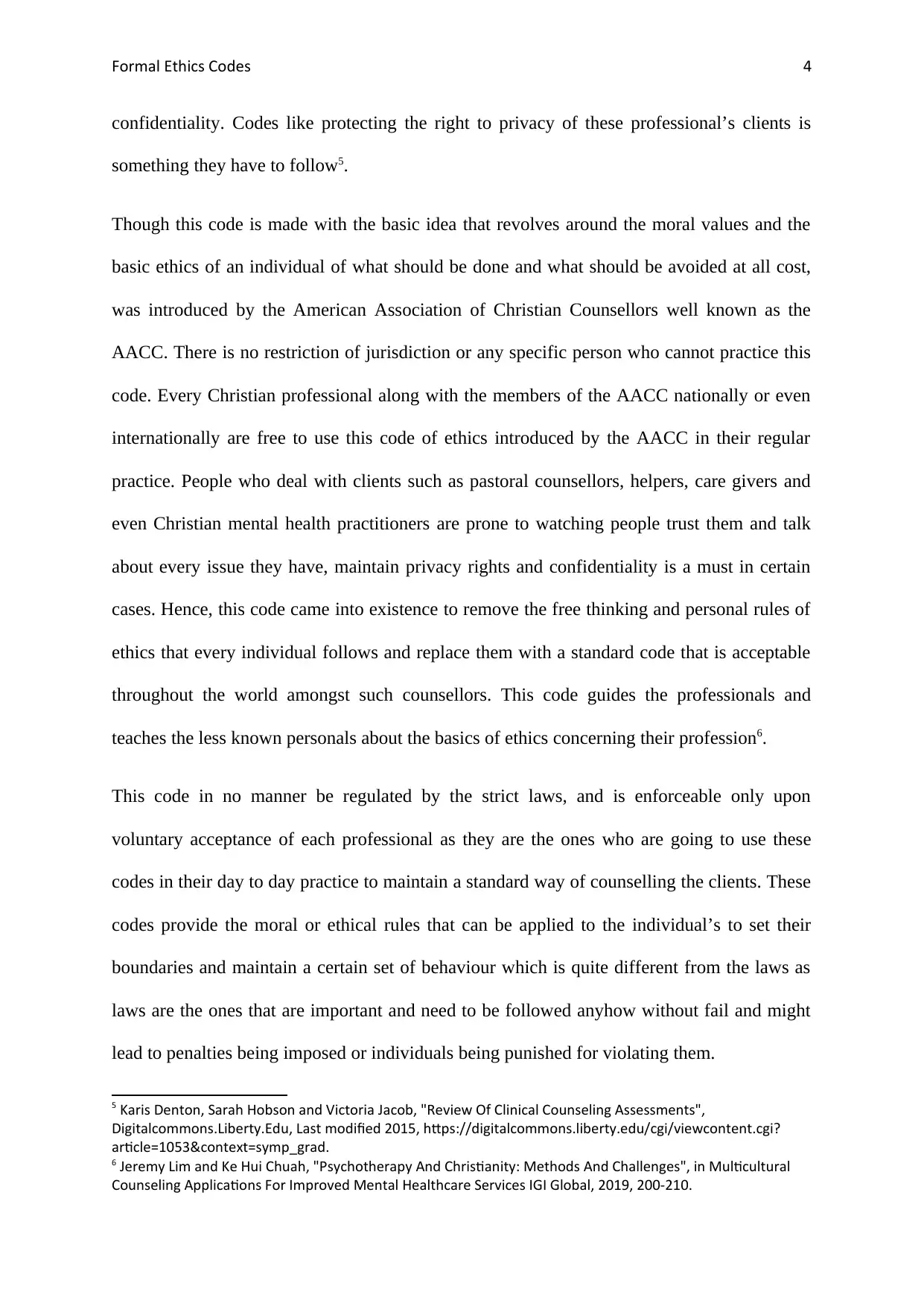
Formal Ethics Codes 4
confidentiality. Codes like protecting the right to privacy of these professional’s clients is
something they have to follow5.
Though this code is made with the basic idea that revolves around the moral values and the
basic ethics of an individual of what should be done and what should be avoided at all cost,
was introduced by the American Association of Christian Counsellors well known as the
AACC. There is no restriction of jurisdiction or any specific person who cannot practice this
code. Every Christian professional along with the members of the AACC nationally or even
internationally are free to use this code of ethics introduced by the AACC in their regular
practice. People who deal with clients such as pastoral counsellors, helpers, care givers and
even Christian mental health practitioners are prone to watching people trust them and talk
about every issue they have, maintain privacy rights and confidentiality is a must in certain
cases. Hence, this code came into existence to remove the free thinking and personal rules of
ethics that every individual follows and replace them with a standard code that is acceptable
throughout the world amongst such counsellors. This code guides the professionals and
teaches the less known personals about the basics of ethics concerning their profession6.
This code in no manner be regulated by the strict laws, and is enforceable only upon
voluntary acceptance of each professional as they are the ones who are going to use these
codes in their day to day practice to maintain a standard way of counselling the clients. These
codes provide the moral or ethical rules that can be applied to the individual’s to set their
boundaries and maintain a certain set of behaviour which is quite different from the laws as
laws are the ones that are important and need to be followed anyhow without fail and might
lead to penalties being imposed or individuals being punished for violating them.
5 Karis Denton, Sarah Hobson and Victoria Jacob, "Review Of Clinical Counseling Assessments",
Digitalcommons.Liberty.Edu, Last modified 2015, https://digitalcommons.liberty.edu/cgi/viewcontent.cgi?
article=1053&context=symp_grad.
6 Jeremy Lim and Ke Hui Chuah, "Psychotherapy And Christianity: Methods And Challenges", in Multicultural
Counseling Applications For Improved Mental Healthcare Services IGI Global, 2019, 200-210.
confidentiality. Codes like protecting the right to privacy of these professional’s clients is
something they have to follow5.
Though this code is made with the basic idea that revolves around the moral values and the
basic ethics of an individual of what should be done and what should be avoided at all cost,
was introduced by the American Association of Christian Counsellors well known as the
AACC. There is no restriction of jurisdiction or any specific person who cannot practice this
code. Every Christian professional along with the members of the AACC nationally or even
internationally are free to use this code of ethics introduced by the AACC in their regular
practice. People who deal with clients such as pastoral counsellors, helpers, care givers and
even Christian mental health practitioners are prone to watching people trust them and talk
about every issue they have, maintain privacy rights and confidentiality is a must in certain
cases. Hence, this code came into existence to remove the free thinking and personal rules of
ethics that every individual follows and replace them with a standard code that is acceptable
throughout the world amongst such counsellors. This code guides the professionals and
teaches the less known personals about the basics of ethics concerning their profession6.
This code in no manner be regulated by the strict laws, and is enforceable only upon
voluntary acceptance of each professional as they are the ones who are going to use these
codes in their day to day practice to maintain a standard way of counselling the clients. These
codes provide the moral or ethical rules that can be applied to the individual’s to set their
boundaries and maintain a certain set of behaviour which is quite different from the laws as
laws are the ones that are important and need to be followed anyhow without fail and might
lead to penalties being imposed or individuals being punished for violating them.
5 Karis Denton, Sarah Hobson and Victoria Jacob, "Review Of Clinical Counseling Assessments",
Digitalcommons.Liberty.Edu, Last modified 2015, https://digitalcommons.liberty.edu/cgi/viewcontent.cgi?
article=1053&context=symp_grad.
6 Jeremy Lim and Ke Hui Chuah, "Psychotherapy And Christianity: Methods And Challenges", in Multicultural
Counseling Applications For Improved Mental Healthcare Services IGI Global, 2019, 200-210.
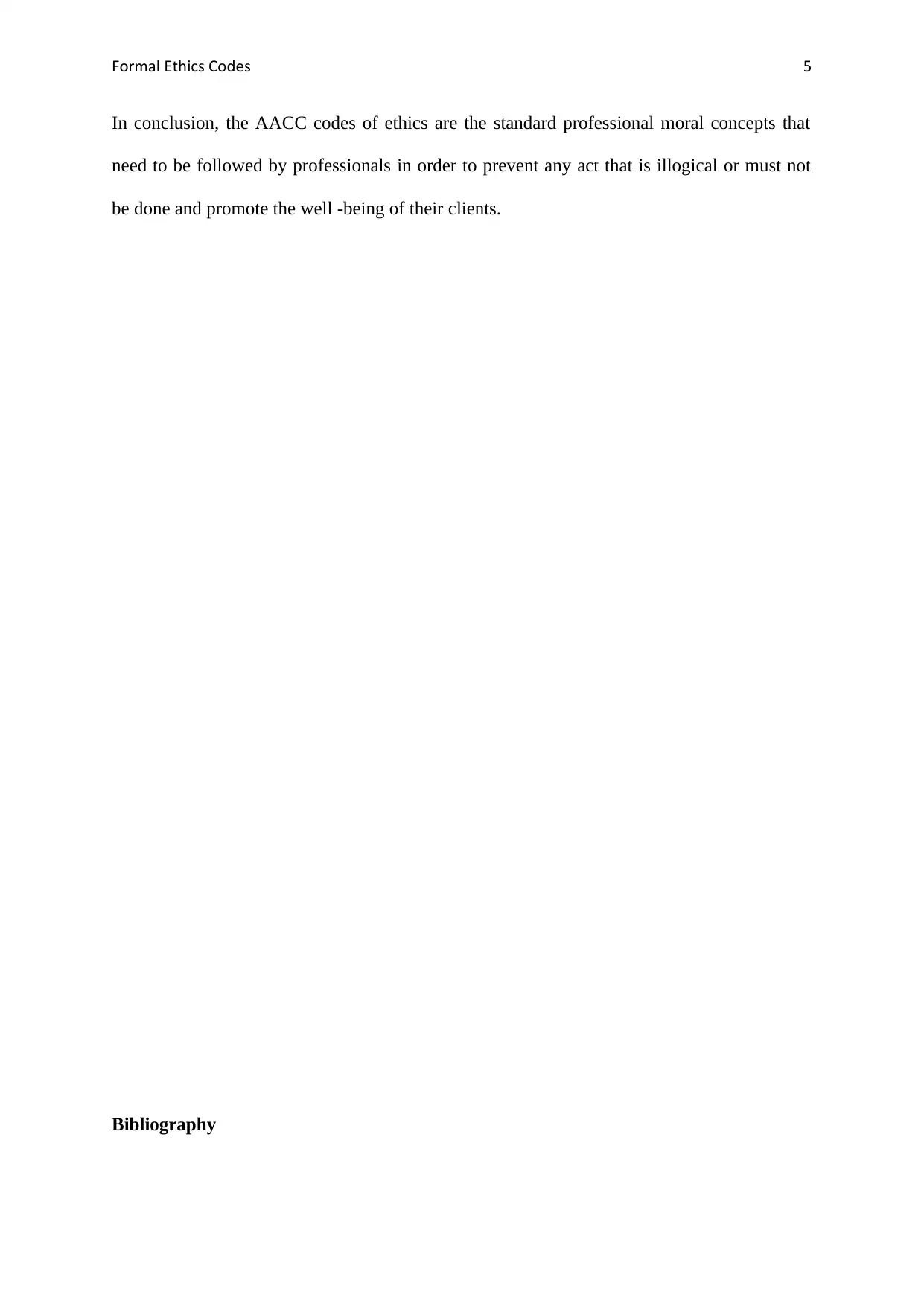
Formal Ethics Codes 5
In conclusion, the AACC codes of ethics are the standard professional moral concepts that
need to be followed by professionals in order to prevent any act that is illogical or must not
be done and promote the well -being of their clients.
Bibliography
In conclusion, the AACC codes of ethics are the standard professional moral concepts that
need to be followed by professionals in order to prevent any act that is illogical or must not
be done and promote the well -being of their clients.
Bibliography
⊘ This is a preview!⊘
Do you want full access?
Subscribe today to unlock all pages.

Trusted by 1+ million students worldwide
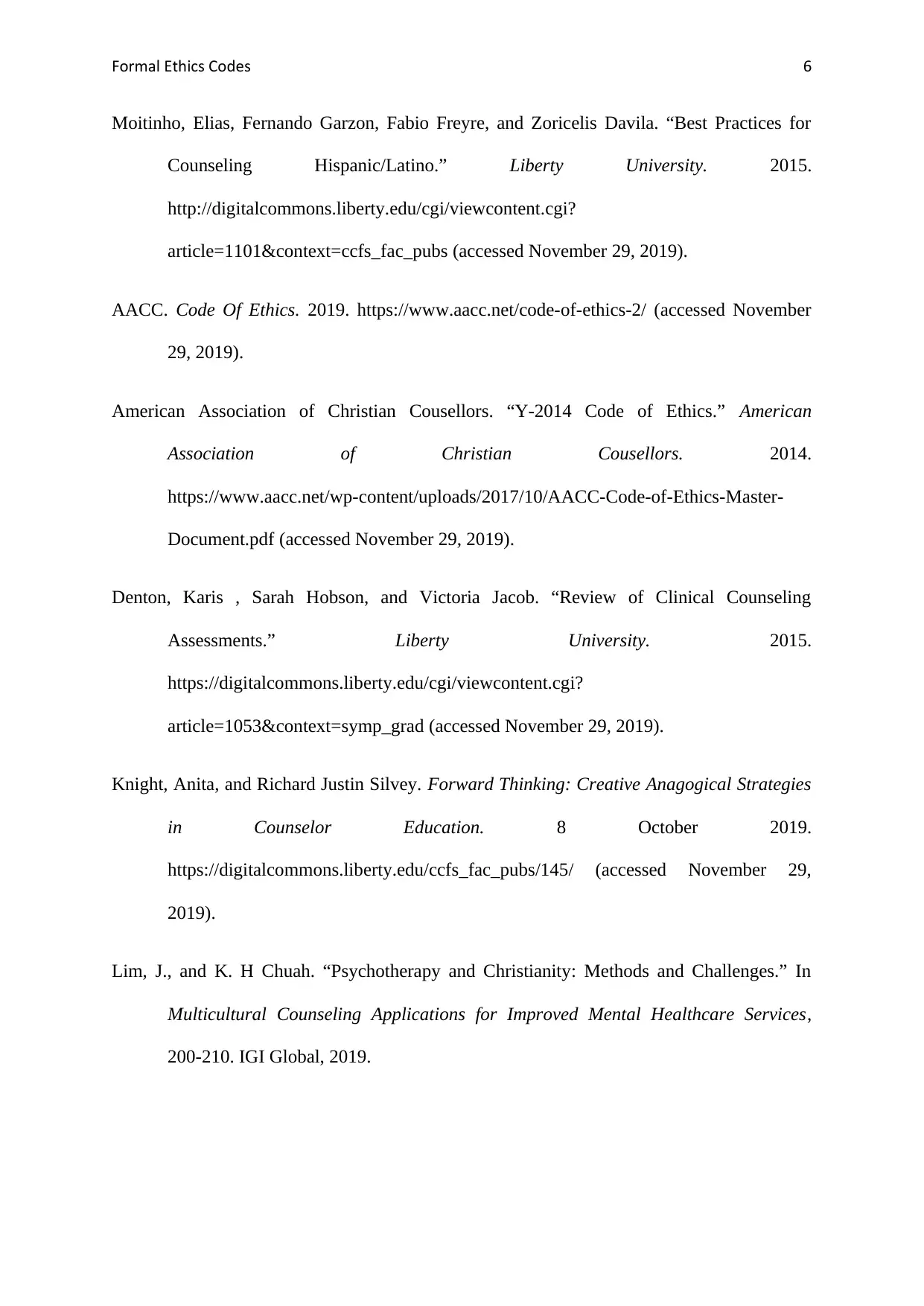
Formal Ethics Codes 6
Moitinho, Elias, Fernando Garzon, Fabio Freyre, and Zoricelis Davila. “Best Practices for
Counseling Hispanic/Latino.” Liberty University. 2015.
http://digitalcommons.liberty.edu/cgi/viewcontent.cgi?
article=1101&context=ccfs_fac_pubs (accessed November 29, 2019).
AACC. Code Of Ethics. 2019. https://www.aacc.net/code-of-ethics-2/ (accessed November
29, 2019).
American Association of Christian Cousellors. “Y-2014 Code of Ethics.” American
Association of Christian Cousellors. 2014.
https://www.aacc.net/wp-content/uploads/2017/10/AACC-Code-of-Ethics-Master-
Document.pdf (accessed November 29, 2019).
Denton, Karis , Sarah Hobson, and Victoria Jacob. “Review of Clinical Counseling
Assessments.” Liberty University. 2015.
https://digitalcommons.liberty.edu/cgi/viewcontent.cgi?
article=1053&context=symp_grad (accessed November 29, 2019).
Knight, Anita, and Richard Justin Silvey. Forward Thinking: Creative Anagogical Strategies
in Counselor Education. 8 October 2019.
https://digitalcommons.liberty.edu/ccfs_fac_pubs/145/ (accessed November 29,
2019).
Lim, J., and K. H Chuah. “Psychotherapy and Christianity: Methods and Challenges.” In
Multicultural Counseling Applications for Improved Mental Healthcare Services,
200-210. IGI Global, 2019.
Moitinho, Elias, Fernando Garzon, Fabio Freyre, and Zoricelis Davila. “Best Practices for
Counseling Hispanic/Latino.” Liberty University. 2015.
http://digitalcommons.liberty.edu/cgi/viewcontent.cgi?
article=1101&context=ccfs_fac_pubs (accessed November 29, 2019).
AACC. Code Of Ethics. 2019. https://www.aacc.net/code-of-ethics-2/ (accessed November
29, 2019).
American Association of Christian Cousellors. “Y-2014 Code of Ethics.” American
Association of Christian Cousellors. 2014.
https://www.aacc.net/wp-content/uploads/2017/10/AACC-Code-of-Ethics-Master-
Document.pdf (accessed November 29, 2019).
Denton, Karis , Sarah Hobson, and Victoria Jacob. “Review of Clinical Counseling
Assessments.” Liberty University. 2015.
https://digitalcommons.liberty.edu/cgi/viewcontent.cgi?
article=1053&context=symp_grad (accessed November 29, 2019).
Knight, Anita, and Richard Justin Silvey. Forward Thinking: Creative Anagogical Strategies
in Counselor Education. 8 October 2019.
https://digitalcommons.liberty.edu/ccfs_fac_pubs/145/ (accessed November 29,
2019).
Lim, J., and K. H Chuah. “Psychotherapy and Christianity: Methods and Challenges.” In
Multicultural Counseling Applications for Improved Mental Healthcare Services,
200-210. IGI Global, 2019.
1 out of 7
Your All-in-One AI-Powered Toolkit for Academic Success.
+13062052269
info@desklib.com
Available 24*7 on WhatsApp / Email
![[object Object]](/_next/static/media/star-bottom.7253800d.svg)
Unlock your academic potential
Copyright © 2020–2026 A2Z Services. All Rights Reserved. Developed and managed by ZUCOL.

